'Big Hero 6' Directors Don Hall And Chris Williams Talk Pitching And Creating Characters
Earlier this summer, a group of journalists was invited to Disney Animation Studios in Burbank, CA to learn about the impressive process that went into their latest film Big Hero 6. Big Hero 6 is based on, but not linked to, a Marvel comic book of the same name. That makes it the first Disney animated Marvel movie and while the comic and film share very little in common two things they do share are the focus on action and emotion.
We posted a nice long piece about all of the cool tidbits we learned about the film but, we also got a chance to sit down with some of the lead creators of the film. You've already seen our interview with the story guys and now, we've got an interview directors Don Hall and Chris Williams. Hall (Winnie the Pooh) was specifically tasked by John Lasseter to make a movie based on Marvel and Williams (Bolt) was brought on later to help with the load.
In our interview we talk about pitching a story to John Lasseter, working on the film's music, creating some of the superhero personas, the genesis of the project and more. Below, read our interview with the men responsible for Big Hero 6.
Note: This interview was conducted over the summer after seeing only a few minutes of footage. We'll have more on the film once we see the full thing. 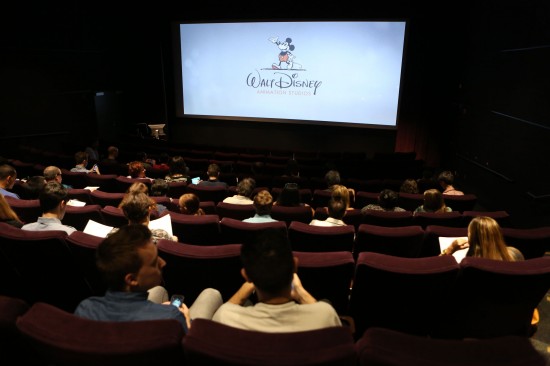 /Film: One of the first things I took out of today, and every time I come her,e is how important story is and how long that takes. But at the same time, you have to pitch something to John Lasseter and it almost sounds like there's nothing to pitch at the beginning. What do you pitch him? Because it takes three years to actually build a story from what you pitch.Don Hall: Well with this one specifically it was more about finding something from the Marvel catalog and bringing it over here and to make our own. So it was finding something that we were passionate about. Really, passion is the key thing. You know, [Lasseter] is looking for 'Are you passionate about it?' Is it going to get him passionate about it? Is he gonna find something in that pitch that stirs something in him?Chris Williams: You just need that seed and that promise.
/Film: One of the first things I took out of today, and every time I come her,e is how important story is and how long that takes. But at the same time, you have to pitch something to John Lasseter and it almost sounds like there's nothing to pitch at the beginning. What do you pitch him? Because it takes three years to actually build a story from what you pitch.Don Hall: Well with this one specifically it was more about finding something from the Marvel catalog and bringing it over here and to make our own. So it was finding something that we were passionate about. Really, passion is the key thing. You know, [Lasseter] is looking for 'Are you passionate about it?' Is it going to get him passionate about it? Is he gonna find something in that pitch that stirs something in him?Chris Williams: You just need that seed and that promise.
Hall: Yeah, and then from there is that world expansive enough? Is it interesting enough? Is that something that would make a great world for an animated film?
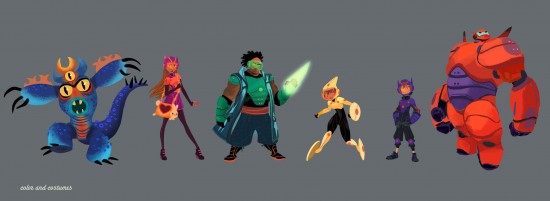 So you don't have a full story. You come in and you say Big Hero 6, these characters, a boy and robot and that's sort of it?
So you don't have a full story. You come in and you say Big Hero 6, these characters, a boy and robot and that's sort of it?
Hall: That's about enough.
Williams: Yeah, what you don't do with John is say, 'Hey John, let me pitch you a story' and you're like half an hour in and you say 'In the second act, this happens.' He doesn't want that because he knows that the story's gonna evolve and change. Does it have something at its core that is emotional? Is there potential for comedy here? He doesn't want to have every beat spelled out. But he is very interested in the world. The one thing that he talks about a lot is the fact that the story is gonna evolve and change a lot over the course of the year, but you're kind of stuck with the world. So start with the world, research the world, really develop it. Make it really compelling and fully realized. That's the first step. Once you have an initial just sort of seed of what the story's gonna be.
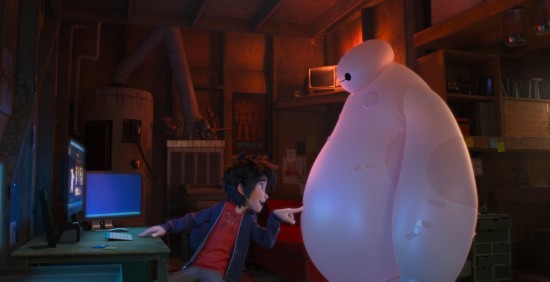 Okay. You talk about he wanted you to bring in a Marvel property and I remember when Disney bought Marvel, the first thing you thought of was 'Are they gonna do an animated Spider-Man movie? Animated Wolverine movie?' And we get Big Hero 6, which is still cool and we still get all those Marvel movies from everywhere else. But do you try to make this Marvel? I know you guys talked about having Joe Quesada and everybody come in and give you notes and stuff. But talk about like how much Marvel is in it. And also is there gonna be a Marvel title card in front?
Okay. You talk about he wanted you to bring in a Marvel property and I remember when Disney bought Marvel, the first thing you thought of was 'Are they gonna do an animated Spider-Man movie? Animated Wolverine movie?' And we get Big Hero 6, which is still cool and we still get all those Marvel movies from everywhere else. But do you try to make this Marvel? I know you guys talked about having Joe Quesada and everybody come in and give you notes and stuff. But talk about like how much Marvel is in it. And also is there gonna be a Marvel title card in front?
Hall: No, it's Disney Animation. We made this here. The idea of infusing more Marvel into something? There was never any discussion about anything like that. It was just sort of in our D.N.A. because I don't even know necessarily what that would mean.
That's a good point.
Hall: Really John fed off my passion. I said, 'I would love to do something like this.' He thought that was great. So there was never any 'How can we make this more Disney? How can we make this more Marvel? Because I don't know. I wouldn't even know how to quantify either one of those things. But I think the common ground being in a lot of the Marvel Comics I remember from being a kid was there was a sense of humor about them and a sense of playfulness. They didn't take them self too seriously. That, I felt like, would be a good tone for this film to have. Especially knowing that if loss was gonna be such a central thematic idea, it had to be balanced out with some comedy.
Williams: And there was an understanding straight away that the movie was gonna be inspired by some of these characters and by Big Hero 6 the comic, but it was going to grow into something that was very different. And they were supportive of that and really cool about it. They were never possessive. They never said 'Oh it shouldn't be this thing.' They would come to the screenings and give feedback. But that was about the extent of it.
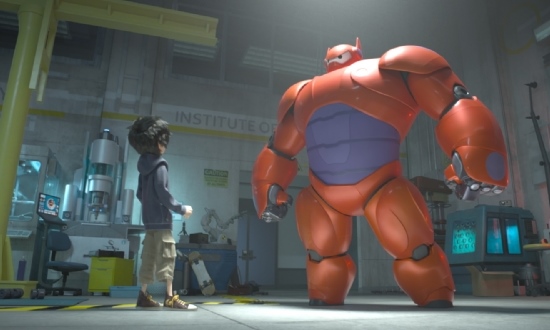 Cool. In the footage today, it was all temp music and I think I heard the Kick-Ass score and a couple other things.
Cool. In the footage today, it was all temp music and I think I heard the Kick-Ass score and a couple other things.
Williams: Right. Good call.
Can you say who's doing the score yet?
Hall: Henry Jackman.
Okay, cool. That's great. What are you sort of like telling him? What's your direction to him at this stage as he's writing the music?
Hall: You know, it's interesting 'cause he takes his direction from the movie. Like he's getting the movie. So he'll take the movie and do his thing, his pass on it. We did it last night. We go down there and listen to his take on the cues. And then we give notes that way. We didn't really issue a lot. I mean, we kind of watched the movie, talked through broad stroke ideas of, you know, we wanted a Baymax theme and that kind of obvious stuff. But Henry takes his cues from just watching the movie and living with the movie and feeding off the movie. And then he presents it to us and we iterate off of that.
Williams: The only thing that was really sort of decided early was because the movie's a synthesis of things and a blend of things. There was gonna be orchestral stuff, but also produced stuff in the score as well. And he's so great at blending those two things.
 Walking around looking at the concept art and stuff, I very much get a video game feel from lots of the visuals. Even though Wreck-It Ralph was just a few years ago, was that every a consideration?
Walking around looking at the concept art and stuff, I very much get a video game feel from lots of the visuals. Even though Wreck-It Ralph was just a few years ago, was that every a consideration?
Hall: No. Especially with the team's suit design, we went far back to like '60s TV shows from Japan. You know, we were looking at stuff like that. Really more obscure kind of references.
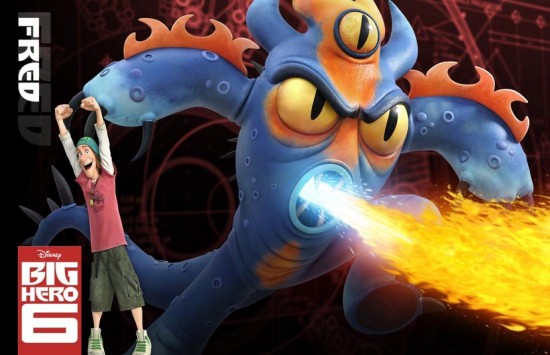 Okay. Now looking at the suits, I sort of understand them all except for Fred's. 'Cause it's sort of organic. It's somebody suggested he might even turns into a Kaiju.
Okay. Now looking at the suits, I sort of understand them all except for Fred's. 'Cause it's sort of organic. It's somebody suggested he might even turns into a Kaiju.
Hall: No.
Williams: He's in a suit.
Okay, well then how did that suit develop?
Hall: Okay, so in the comics he has sort of a ill defined superpower. I never quite understood it. And it felt almost like he was a mutant or something like that. He could emit a sort of ghost like image of a Kaiju. So I put a stake in the ground early on and really wanted to make this grounded and say, 'Okay, they're not superpowered beings.' It's all tech based stuff. Fred was gonna be a challenge in how do we put our stamp on Fred and ground him? And I saw videos online of people putting on Kaiju suits and doing little mock wrestling matches. And when I saw that, I was like 'Oh my God, that's Fred.' The idea that you could have sort of a caricatured, kind of goofy Kaiju suit a la something that might come from Power Rangers or something like that.
Yeah.
Hall: But put some tech into it so it really can breathe fire and jump really high. I thought would be really cool.
Williams: 'Cause Fred is a super fan. He's a fan of the superhero genre and comic books and he's a fan of Kaiju and so it made sense for him to don a suit like that. And when we first meet him, he's the school mascot. So he wears a suit when he's spinning signs and things. So it felt like a natural evolution for him.
